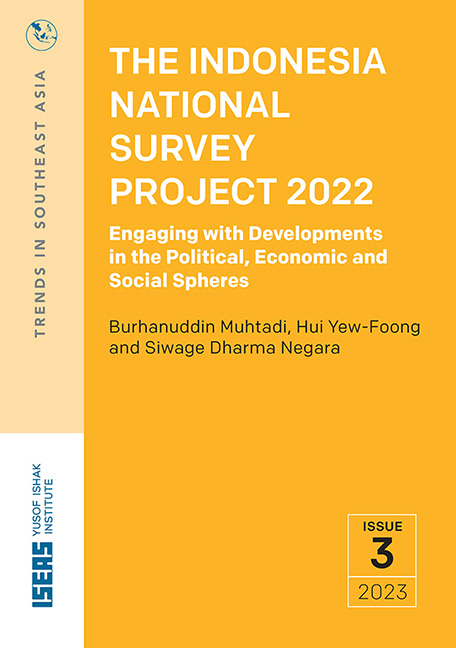 The Indonesia National Survey Project 2022
The Indonesia National Survey Project 2022 Book contents
- Frontmatter
- Foreword
- Table of Contents
- List of Figures and Tables
- The Indonesia National Survey Project 2022: Engaging with Developments in the Political, Economic and Social Spheres: Executive Summary
- 1 The Indonesia National Survey Project 2022: Engaging with Developments in the Political, Economic and Social Spheres: Introduction
- 2 Politics
- 3 Economy
- 4 International Relations
- 5 Society
- 6 Current Issues
- 7 Conclusion
3 - Economy
Published online by Cambridge University Press: 09 January 2024
- Frontmatter
- Foreword
- Table of Contents
- List of Figures and Tables
- The Indonesia National Survey Project 2022: Engaging with Developments in the Political, Economic and Social Spheres: Executive Summary
- 1 The Indonesia National Survey Project 2022: Engaging with Developments in the Political, Economic and Social Spheres: Introduction
- 2 Politics
- 3 Economy
- 4 International Relations
- 5 Society
- 6 Current Issues
- 7 Conclusion
Summary
Evaluation of the Economy
It is important to note that responses related to the evaluation of economic conditions, based on the survey taking place at the end of July 2022, were made in the context of an economy still recovering from the impact of COVID-19, but before the September 2022 announcement of fuel subsidy cuts by President Jokowi, which resulted in increases in fuel price and consequently, inflationary pressure on the price of goods all over the country. In this context, respondents were asked to evaluate the current condition of the Indonesian economy, the condition of the economy as compared to the previous year, and the expected condition of the economy in one year’s time. The data show that 41.5 per cent of respondents perceive the current economic condition as average, 33.4 per cent perceive it as bad, while only 25.1 per cent perceive it as good. However, 38.7 per cent of respondents think that the current economic condition is better compared to the previous year, exceeding those who think that there has been no change (28.8 per cent) and those who think that it is worse (32.4 per cent). When asked about the outlook for the economy in one year’s time, 60.1 per cent think that it will be better, exceeding by a large margin those who think that there will be no change (27.5 per cent) and those who think that it will be worse (12.3 per cent) (Figure 9). Thus, while respondents may seem slightly pessimistic about the current state of the economy, they are more optimistic in comparing the economy to the previous year when the COVID-19 pandemic was hitting the global economy hard, including Indonesia, and when forecasting the performance of the economy for the year to come.
The survey also asked respondents to evaluate their current household economic condition, compare it to the previous year, and give their forecast for the year to come. Overall, their responses are more optimistic than their assessment of the national economy. The survey found that 29.9 per cent of respondents perceive their current household economic condition to be good, higher than those who perceive their household economic condition to be bad (22 per cent).
- Type
- Chapter
- Information
- The Indonesia National Survey Project 2022Engaging with Developments in the Political, Economic and Social Spheres, pp. 20 - 33Publisher: ISEAS–Yusof Ishak InstitutePrint publication year: 2023
